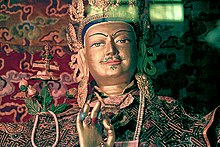
Back تريسونج ديتسين ARZ Трисонг Децен Bulgarian খ্রি-স্রোং-ল্দে-ব্ত্সান Bengali/Bangla ཁྲི་སྲོང་ལྡེ་བཙན། Tibetan Thisong Decän Czech Thrisong Detsen German ཆོས་རྒྱལ་ཁྲི་སྲོང་ལྡེའི་བཙན། King Thrisong Detsen Bhutani Τίσογκ-ντέτσεν Greek Trisong Detsen Estonian Trisong Detsen French
| Tri Songdetsen ཁྲི་སྲོང་ལྡེ་བཙན | |||||
|---|---|---|---|---|---|
| Tsenpo | |||||
 Tri Songdetsen statue at Samye. | |||||
| Emperor of Tibet | |||||
| Reign | 755–794 | ||||
| Predecessor | Me Agtsom | ||||
| Successor | Muné Tsenpo | ||||
| Regent | Mashang Drompakye | ||||
| Born | 742 | ||||
| Died | 797 (age 55) | ||||
| Burial | Trülri Tsuknang Mausoleum, Valley of the Kings | ||||
| Spouse | Tsépongza Métokdrön Chimza Lhamotsen Kharchenza Chogyel Droza Trigyel Motsen (aka Jangchup Jertsen) Poyöza Gyel Motsün Yéshé Tsogyel | ||||
| Issue | Mutri Songpo Muné Tsenpo Mutik Tsenpo Sadnalegs | ||||
| |||||
| Lönchen | |||||
| Father | Me Agtsom | ||||
| Mother | Nanamza Mangpodé Zhiteng | ||||
| Religion | Tibetan Buddhism | ||||
Tri Songdetsen (Tibetan: ཁྲོ་སྲོང་ལྡེ་བརྩན། ཁྲི་སྲོང་ལྡེ་བཙན, Wylie: khri srong lde brtsan/btsan, ZYPY: Chisong Dêzän, Lhasa dialect: [ʈʂʰisoŋ tetsɛ̃]) was the son of Me Agtsom, the 38th emperor of Tibet. He ruled from AD 755 until 797 or 804. Tri Songdetsen was the second of the Three Dharma Kings of Tibet, playing a pivotal role in the introduction of Buddhism to Tibet and the establishment of the Nyingma or "Ancient" school of Tibetan Buddhism.
The empire Tri Songdetsen inherited had declined somewhat from its greatest extent under the first Dharma King, Songtsen Gampo. Disintegration continued when, in 694, Tibet lost control of several cities in Turkestan and, in 703, Nepal broke into rebellion. Meanwhile, Arab forces vied for influence along the western borderlands of the Tibetan empire. Nevertheless, Tri Songdetsen became imperial Tibet's greatest ruler and an unparalleled Buddhist benefactor.[1]
- ^ Kapstein, M. (2013). Tibetan Buddhism: A very short introduction.